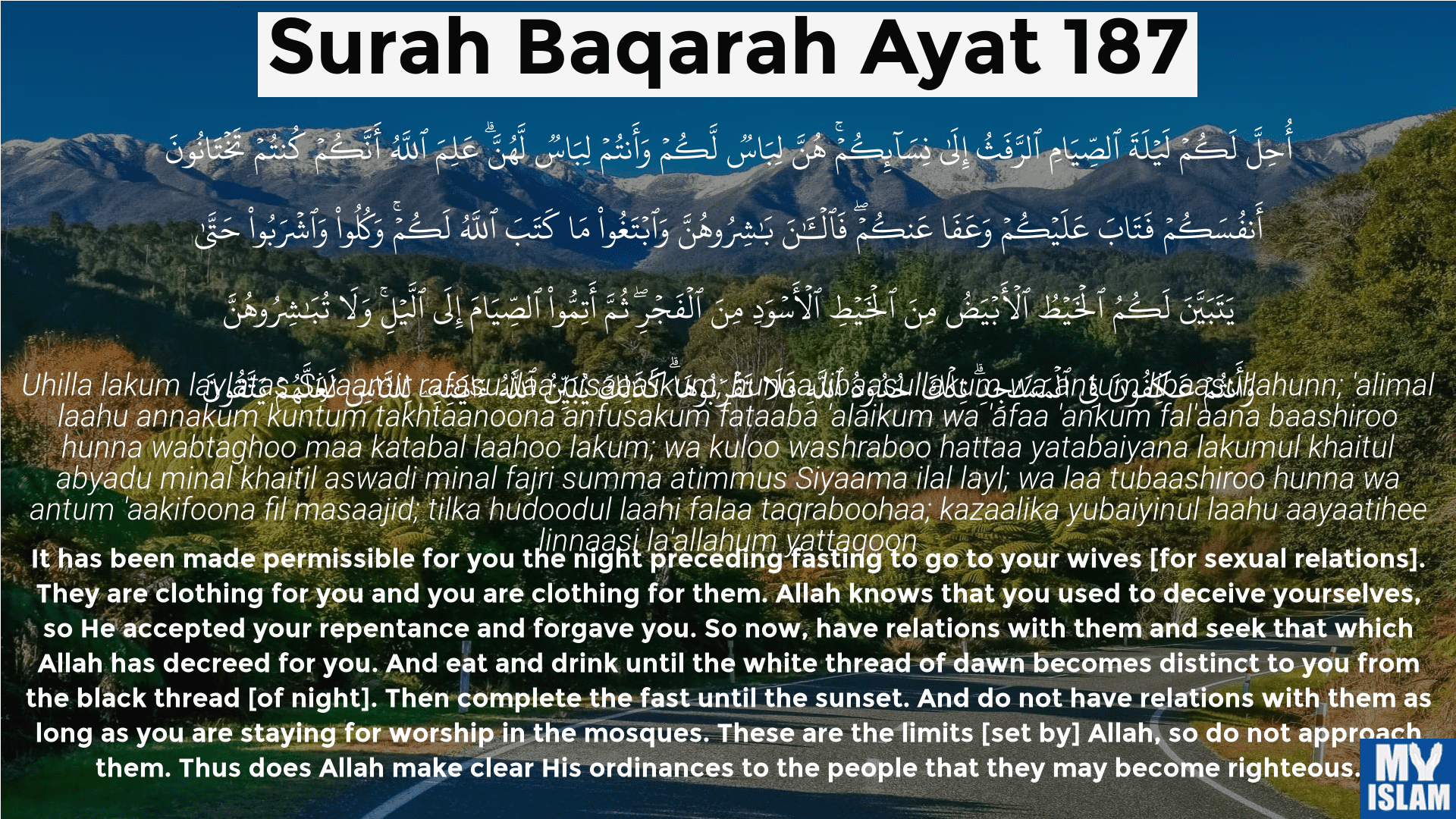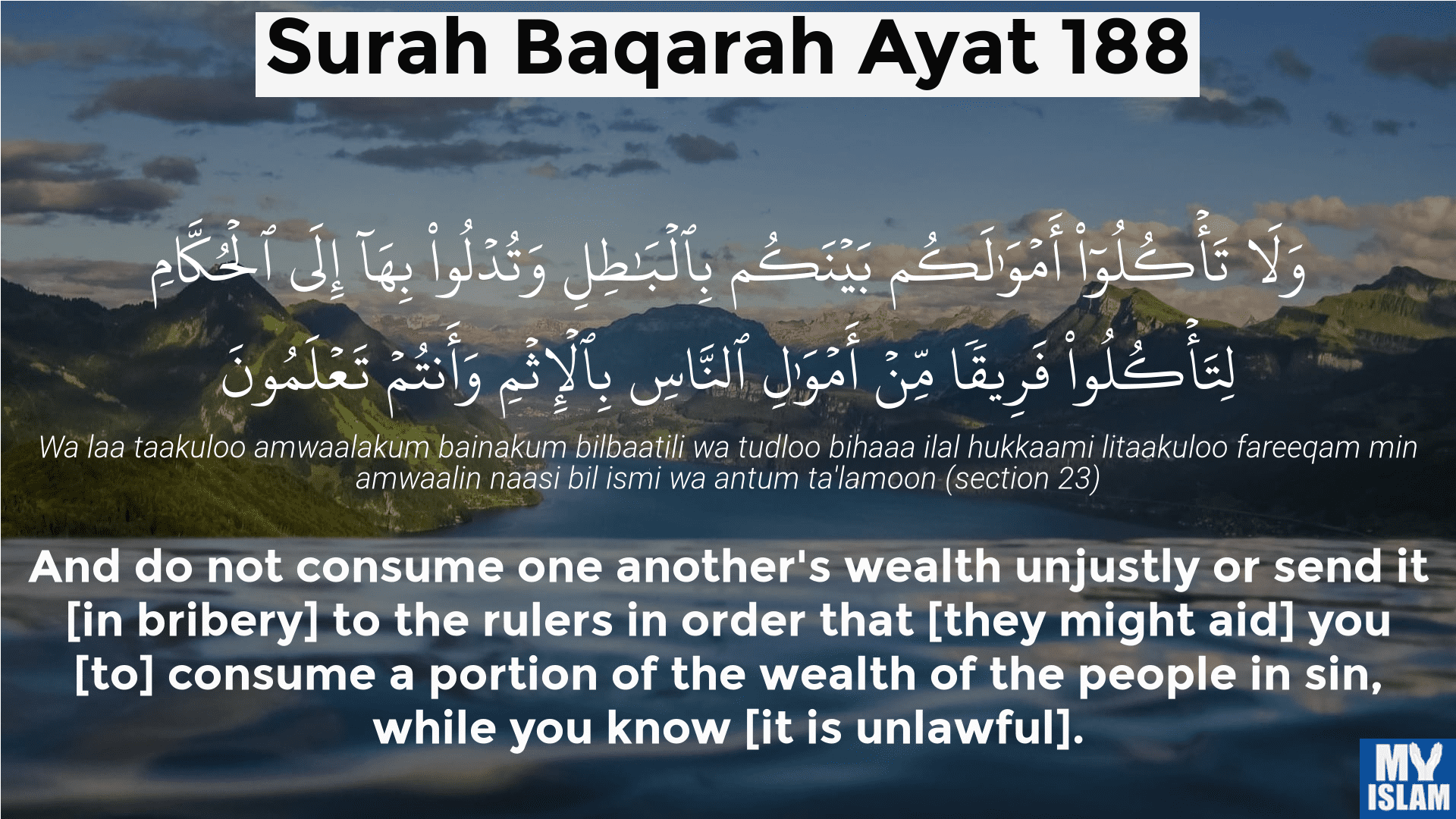Surah Baqarah Ayat 184 in Arabic Text
English Translation
Here you can read various translations of verse 184
[Fasting for] a limited number of days. So whoever among you is ill or on a journey [during them] – then an equal number of days [are to be made up]. And upon those who are able [to fast, but with hardship] – a ransom [as substitute] of feeding a poor person [each day]. And whoever volunteers excess – it is better for him. But to fast is best for you, if you only knew.
“(Fasting) for a fixed number of days; but if any of you is ill, or on a journey, the prescribed number (Should be made up) from days later. For those who can do it (With hardship), is a ransom, the feeding of one that is indigent. But he that will give more, of his own free will,- it is better for him. And it is better for you that ye fast, if ye only knew.
The Fast is to be observed for a fixed number of days. If, however, anyone of you be sick or on a journey, he should fast the same number of other days. As for those who can fast (but do not), the expiation of this shall be the feeding of one needy person for one fast day, and whoso does more than this with a willing heart does it for his own good. But if you understand the thing, it is better for you to observe the Fast.
[Observing Saum (fasts)] for a fixed number of days, but if any of you is ill or on a journey, the same number (should be made up) from other days. And as for those who can fast with difficulty, (e.g. an old man, etc.), they have (a choice either to fast or) to feed a Miskin (poor person) (for every day). But whoever does good of his own accord, it is better for him. And that you fast, it is better for you if only you know.
(Fast) a certain number of days; and (for) him who is sick among you, or on a journey, (the same) number of other days; and for those who can afford it there is a ransom: the feeding of a man in need – but whoso doeth good of his own accord, it is better for him: and that ye fast is better for you if ye did but know –
(The fast is) (for) a prescribed number of days. So, whoever of you is sick or is on a journey, then a (fixed) number of other days; and against the ones who can afford it, there should be a ransom of food for an indigent man; (yet) whoever volunteers charitably, then it is most charitable on his part; and to fast is more charitable for you, in case you know.
Fast for a specific number of days, but if one of you is ill, or on a journey, on other days later. For those who can fast only with extreme difficulty, there is a way to compensate- feed a needy person. But if anyone does good of his own accord, it is better for him, and fasting is better for you, if only you knew.
گنتی کے چند ہی دن ہیں لیکن تم میں سے جو شخص بیمار ہو یا سفر میں ہو تو وه اور دنوں میں گنتی کو پورا کر لے اور اس کی طاقت رکھنے والے فدیہ میں ایک مسکین کو کھانا دیں، پھر جو شخص نیکی میں سبقت کرے وه اسی کے لئے بہتر ہے لیکن تمہارے حق میں بہتر کام روزے رکھنا ہی ہے اگر تم باعلم ہو
Quran 2 Verse 184 Explanation
For those looking for commentary to help with the understanding of Surah Baqarah ayat 184, we’ve provided two Tafseer works below. The first is the tafseer of Abul Ala Maududi, the second is of Ibn Kathir.
Ala-Maududi
(2:184) Fasting is for a fixed number of days, and if one of you be sick, or if one of you be on a journey, you will fast the same number of other days later on. For those who are capable of fasting (but still do not fast) there is a redemption: feeding a needy man for each day missed. Whoever voluntarily does more good than is required, will find it better for him;[184] and that you should fast is better for you, if you only know.[185]
184. This act of extra merit could either be feeding more than the one person required or both fasting and feeding the poor.
185. Here ends the early injunction with regard to fasting which was revealed in 2 A.H. prior to the Battle of Badr. The verses that follow were revealed about one year later and are linked with the preceding verses since they deal with the same subject.
Ibn-Kathir
183. O you who believe! Fasting is prescribed for you as it was prescribed for those before you, that you may acquire Taqwa. 184. Fast for a fixed number of days, but if any of you is ill or on a journey, the same number (should be made up) from other days. And as for those who can fast with difficulty, (e.g., an old man), they have (a choice either to fast or) to feed a Miskin (poor person) (for every day). But whoever does good of his own accord, it is better for him. And that you fast is better for you if only you know.
In an address to the believers of this Ummah, Allah ordered them to fast, that is, to abstain from food, drink and sexual activity with the intention of doing so sincerely for Allah the Exalted alone. This is because fasting purifies the souls and cleanses them from the evil that might mix with them and their ill behavior. Allah mentioned that He has ordained fasting for Muslims just as He ordained it for those before them, they being an example for them in that, so they should vigorously perform this obligation more obediently than the previous nations. Similarly, Allah said:
(To each among you, We have prescribed a law and a clear way. If Allah had willed, He would have made you one nation, but that (He) may test you in what He has given you; so compete in good deeds.) (5:48)
Allah said in this Ayah:
(O you who believe! Fasting is prescribed for you as it was prescribed for those before you, that you may have Taqwa).) since the fast cleanses the body and narrows the paths of Shaytan. In the Sahihayn the following Hadith was recorded:
.(O young people! Whoever amongst you can afford marriage, let him marry. Whoever cannot afford it, let him fast, for it will be a shield for him.)
Allah then states that the fast occurs during a fixed number of days, so that it does not become hard on the hearts, thereby weakening their resolve and endurance.)
Al-Bukhari and Muslim recorded that `A’ishah said, “(The day of) `Ashura’ was a day of fasting. When the obligation to fast Ramadan was revealed, those who wished fasted, and those who wished did not.” Al-Bukhari recorded the same from Ibn `Umar and Ibn Mas`ud.
Allah said:
(…those who can fast with difficulty, (e.g., an old man), they have (a choice either to fast or) to feed a Miskin (poor person) (for every day).)
Mu`adh commented, “In the beginning, those who wished, fasted and those who wished, did not fast and fed a poor person for each day.” Al- Bukhari recorded Salamah bin Al-Akwa` saying that when the Ayah:
(…those who can fast with difficulty, (e.g., an old man), they have (a choice either to fast or) to feed a Miskin (poor person) (for every day).) was revealed, those who did not wish to fast, used to pay the Fidyah (feeding a poor person for each day they did not fast) until the following Ayah (2:185) was revealed abrogating the previous Ayah. It was also reported from `Ubaydullah from Nafi` that Ibn `Umar said; “It was abrogated.” As-Suddi reported that Murrah narrated that `Abdullah said about this Ayah:
(those who can fast with difficulty, (e.g., an old man), they have (a choice either to fast or) to feed a Miskin (poor person) (for every day).) “It means `those who find it difficult (to fast).’ Formerly, those who wished, fasted and those who wished, did not but fed a poor person instead.” Allah then said:
(But whoever does good of his own accord) meaning whoever fed an extra poor person,
(it is better for him. And that you fast is better for you) Later the Ayah:
(So whoever of you sights (the crescent on the first night of) the month (of Ramadan, i.e., is present at his home), he must observe Sawm (fasting) that month) (2:185) was revealed and this abrogated the previous Ayah (2:184).
Al-Bukhari reported that `Ata heard Ibn `Abbas recite:
(And as for those who can fast with difficulty, (e.g., an old man), they have (a choice either to fast or) to feed a Miskin (poor person) (for every day).)
Ibn `Abbas then commented, “(This Ayah) was not abrogated, it is for the old man and the old woman who are able to fast with difficulty, but choose instead to feed a poor person for every day (they do not fast).” Others reported that Sa`id bin Jubayr mentioned this from Ibn `Abbas. So the abrogation here applies to the healthy person, who is not traveling and who has to fast, as Allah said:
(So whoever of you sights (the crescent on the first night of) the month (of Ramadan, i.e., is present at his home), he must observe Sawm (fasting) that month.) (2:185)
As for the old man (and woman) who cannot fast, he is allowed to abstain from fasting and does not have to fast another day instead, because he is not likely to improve and be able to fast other days. So he is required to pay a Fidyah for every day missed. This is the opinion of Ibn `Abbas and several others among the Salaf who read the Ayah:
(And as for those who can fast with difficulty, (e.g., an old man)) to mean those who find it difficult to fast as Ibn Mas`ud stated. This is also the opinion of Al-Bukhari who said, “As for the old man (person) who cannot fast, (he should do like) Anas who, for one or two years after he became old fed some bread and meat to a poor person for each day he did not fast.”
This point, which Al-Bukhari attributed to Anas without a chain of narrators, was collected with a continuous chain of narrators by Abu Ya`la Mawsuli in his Musnad, that Ayyub bin Abu Tamimah said; “Anas could no longer fast. So he made a plate of Tharid (broth, bread and meat) and invited thirty poor persons and fed them.” The same ruling applies for the pregnant and breast-feeding women if they fear for themselves or their children or fetuses. In this case, they pay the Fidyah and do not have to fast other days in place of the days that they missed.
Quick navigation links






